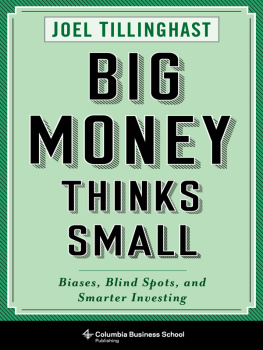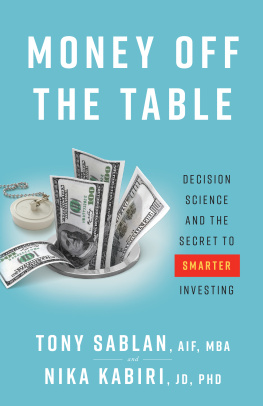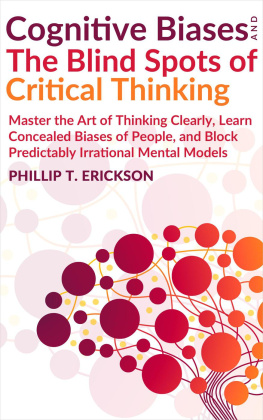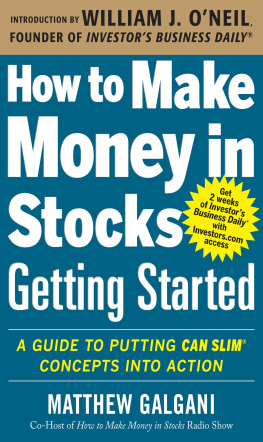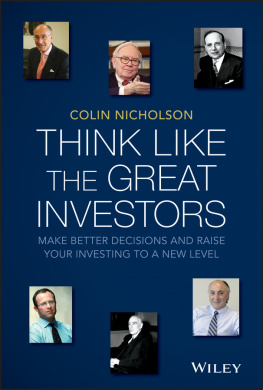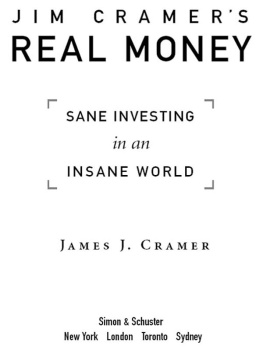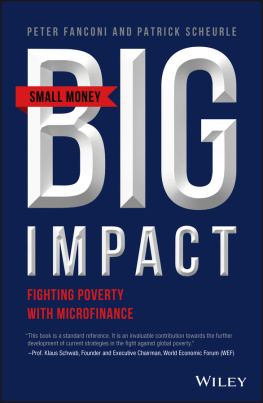Table of Contents
Big Money Thinks Small
COLUMBIA BUSINESS SCHOOL PUBLISHING
Columbia University Press
Publishers Since 1893
New York Chichester, West Sussex
cup.columbia.edu
Copyright 2017 Joel Tillinghast
All rights reserved
EISBN 978-0-231-54469-6
Library of Congress Cataloging-in-Publication Data
Names: Tillinghast, Joel, author.
Title: Big money thinks small : biases, blind spots, and smarter investing / Joel Tillinghast.
Description: New York: Columbia University Press, [2017] | Includes index. | Identifiers: LCCN 2016048351 (print) | LCCN 2017011170 (ebook) | ISBN 9780231544696 (electronic) | ISBN 9780231175708 (cloth : alk. paper)
Subjects: LCSH: Investments. | Stocks. | Portfolio management. | Finance, Personal.
Classification: LCC HG4515 (ebook) | LCC HG4515 .T55 2017 (print) | DDC 332.6dc23
LC record available at https://lccn.loc.gov/2016048351
A Columbia University Press E-book.
CUP would be pleased to hear about your reading experience with this e-book at .
COVER DESIGN: Noah Arlow
Contents
PETER LYNCH
I have been an active stock picker for virtually my entire life, so it pains me when critics conveniently lump everyone into the same bucket and say active managers cannot beat their benchmarks. Well, I am here to tell you that is simply not true. Investors need to know that not all active managers are created equal. There are many skilled investment professionals whose funds have beaten their benchmarks over timeand Joel Tillinghast is right up there with any of them. Joel has now successfully managed the Fidelity Low-Priced Stock Fund more than twice as long as I had managed Fidelity Magellan.
There are a lot of books out there that purport to help you become a better investor. But few mesh the human aspects of investing and business with the numbers side, and even fewer do that by drawing on the experiences of arguably one of the most successful stock pickers and active mutual fund portfolio managers over the past three decades. Whether you are a professional investor or a beginner, Big Money Thinks Small can help you better understand how to avoid common investing tricks, traps, and mistakes.
I have been investing for over fifty years and have had the pleasure of working with and meeting some of the greatest minds in investing, from Mario Gabelli and Sir John Templeton to Warren Buffett and Will Danoff. Simply put, Joel is up there with all of them. I can say this with a great deal of confidence, not only because Ive known Joel for over thirty years but also because I hired him at Fidelity. Since then, I have witnessed Joels growth as an investment professional, and I continue to be amazed by his almost unworldly ability to consume mountains of information about hundreds of companies at a time, analyze it, distill it, and use it to find long-term winners while avoiding many of the losers.
It is this analytical ability, combined with his customer-first mindset, that got me to take Joels cold call more than thirty years ago when he was looking for a new professional challenge. I remember he got through to my assistant Paula Sullivan, who told me, You have to talk to this guy. He keeps calling and is so sweet. He is from the Midwest and I think he might be a farmer. I told Paula, I can give him five minutes. So Joel got on the phone and I was immediately impressed by him. He was a stock hound and had so many great ideas, like Puerto Rican Cement. Then he started talking about a savings and loan I had never heard about that got me excited. We talked about more companies, like Chrysler and Armstrong Rubber. I ended up talking with him for well over an hour. Once we hung up, I immediately called the head of Fidelitys investment division and said, Weve got to hire this guy. He is unbelievable. He is as strong as anyone I have ever met. This was September 1986, and the rest is history. While past performance is no guarantee of future results, Joel has delivered impressive results for the shareholders of his fund over his nearly twenty-eight-year tenure.
In my book (not literally, of course), Joel is one of the greatest, most successful stock pickers of all time. He is truly a shining example of an active manager who has been able to beat the street. If you were to look up alpha in the dictionary, I would argue there should be a picture of Joel. He is a unique, one-of-a-kind investor, so there is no recipe for replicating his success. That said, Joel clearly embodies the qualities and characteristics that I believe are critical to being a great investor. He is patient, open-minded, and flexible. He also has the ability to ignore the worries of the world long enough to allow his investments to succeed, and he has a willingness to do independent research and an equal willingness to admit when he is wrong and exit. He is persistent, but not stubborn. While good investors have some of these qualities, great investors like Joel have all of them.
Another quality that truly separates Joel from the rest of the professional investing pack is his ability to find value where no one else, or at least very few, might be looking. In his book, Joel talks about water utility stocks. Water stocks are boring. And when you add in strange names like Dwr Cymru (Welsh Water), Severn Trent, and Northumbrian Water, it is almost a given that very few people are looking at themcertainly not to the degree of analysts covering companies like Google or Apple. Those who do look usually do not have the patience and commitment to doing the deep fundamental research needed to understand the stories and find opportunities. I remember talking with Joel about these water utilities, and the fundamental story was really compelling. Who else but Joel would look at these?
Joel also has shown a consistent ability to find long-term growth stocks before they experience their big run-ups. After all, it is the ones you miss on the way up that hurt the most. In this book, Joel highlights a few of the companies he found early in their growth cycle that ended up being big contributors to past performance of the Fidelity Low-Priced Stock Fundnames such as Ross Stores, AutoZone, Monster Beverage, Ansys, and numerous others. The tendency of most investors is to cash out after a stock moves up 10 or 15 percent and move on to something else. But just because a stock goes up 10 or 15 percent doesnt mean there isnt room for significantly more growth. A successful investor is one who holds on for the long term and continues to monitor the fundamental story, and if it remains in place you stay, and if not you move on. It is that and his other skills that made Joel such an incredibly successful investor over his career.
In Big Money Thinks Small, Joel draws on his experience as a seasoned active equity mutual fund manager to illustrate how certain investment theories can succeedand fail. While he has proven a keen ability to succeed over his career, Joel, like all investors, is not infallible. Stock picking is hard work, and over nearly three decades, even the best investors, like Joel, are going to make mistakes. It is what you do over your complete body of work that matters. In this book, Joel does an exceptional job of examining some of his major sources of investment regrets and suggests ways readers can potentially avoid the same mistakes.

